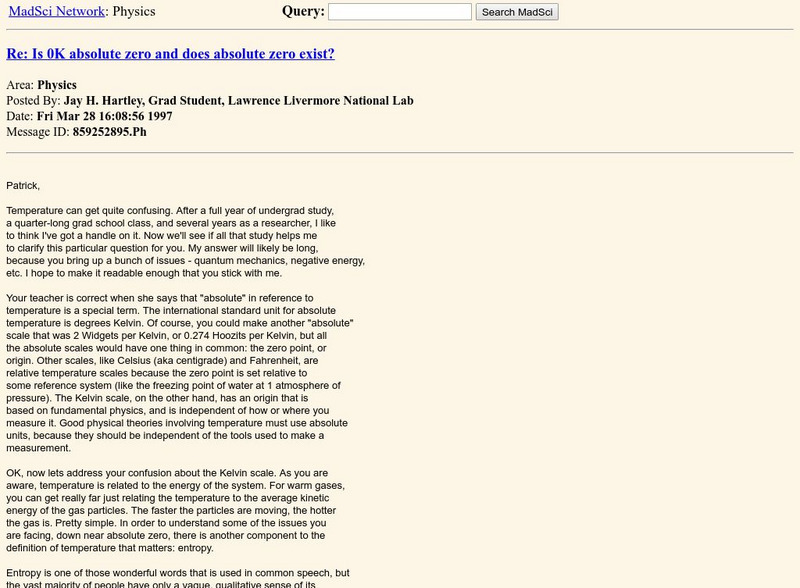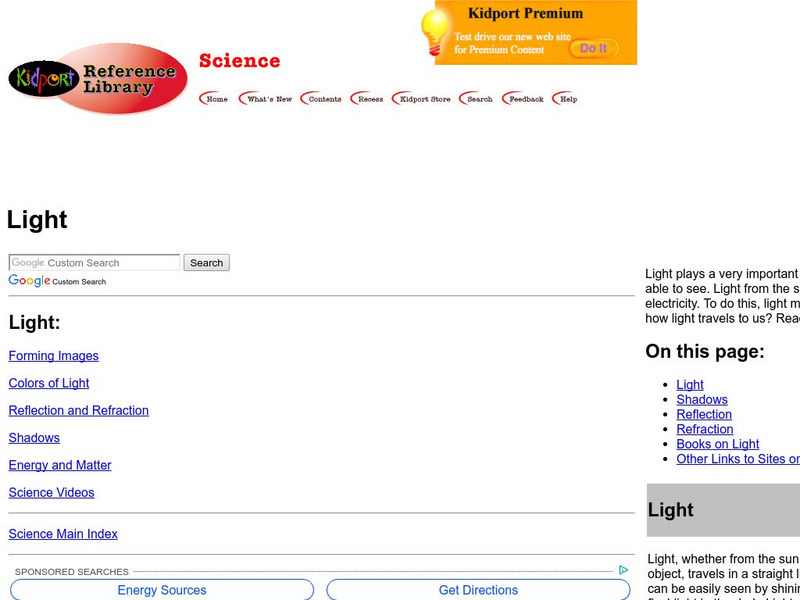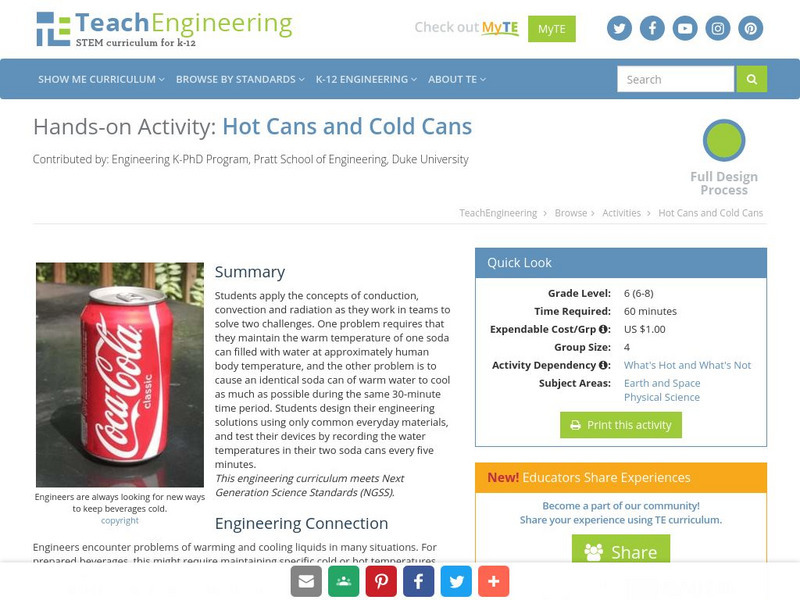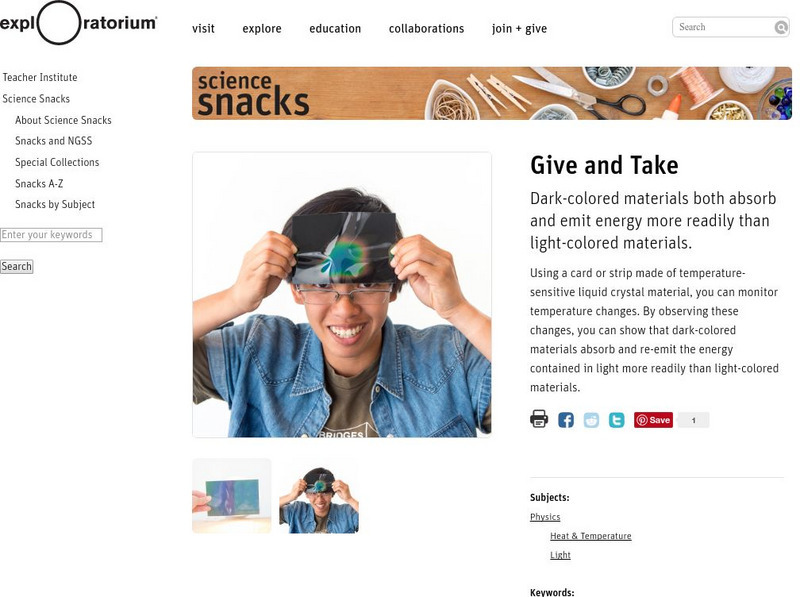Hi, what do you want to do?
Chemistry Collective
Chem Collective: Coffee Problem
In this activity, students use knowledge of specific heat capacity to mix together hot coffee and cold milk to create a solution of coffee at a desired temperature. In this randomized problem, each student is given a different final...
American Chemical Society
Middle School Chemistry: Chemical Reactions & Engineering Design
This lesson begins with a story about rescuing reptile eggs from a new construction site. Using the story as motivation, students are presented with an engineering design challenge: Build a portable device which can warm, support, and...
American Chemical Society
Middle School Chemistry: The Ups and Downs of Thermometers
Based on experimental observations, students describe, on the molecular level, why the liquid in a thermometer goes up when it is heated and down when it is cooled.
Physics Classroom
The Physics Classroom: Thermal Physics
A two-lesson tutorial on thermal energy in the study of physics. Lessons include informational text, interactive activities, animations, and quick, interactive comprehension check-ins.
Curated OER
Fund. Of Phys. Geography/energy, Temperature, and Heat
A page describing (in part) the distinction between energy, temperature and heat. Includes graphic illustrating the quantity of energy needed to transform water between its various states. Methods of thermal energy transfer (convection,...
Science Struck
Science Struck: Conduction, Convection, and Radiation
Explains the concept of heat transfer and describes conduction, convection, and radiation which are the three modes of heat transfer. Includes formulas, examples, and applications.
CK-12 Foundation
Ck 12: Physics: Thermal Properties Study Guide
A study guide for concepts related to thermal energy.
MadSci Network
The Mad Scientist Network/is 0 K Absolute Zero?
Using a question and answer format, this page explains what is meant by the term "absolute zero." The basis for the Kelvin temperature scale is described. And the relationship between heat or energy and temperature is discussed.
TeachEngineering
Teach Engineering: How Hot Is It?
Students learn about the nature of thermal energy, temperature and how materials store thermal energy. They discuss the difference between conduction, convection and radiation of thermal energy, and complete activities in which they...
University of Sydney (Australia)
Thermal Physics Module: Thermal Expansion [Pdf]
A lengthy set of lecture notes on the topics of thermal expansion and heat absorption. The concept of specific heat capacity is explained and numerical examples are discussed. Heats of transformation (fusion, vaporization) are explained...
Kidport
Kidport: Light
Did you know that light is a form of energy and always travels in a straight line? Discover some more interesting facts about light.
Georgia State University
Georgia State University: Hyper Physics: Radiation Cooling of Body
Discusses the means by which the body regulates its temperature. The role of radiation in this process is explained. An equation for calculating the rate at which energy is transferred by radiation is presented. Also, an interactive...
Georgia State University
Georgia State University: Hyper Physics: Thermal Expansion
Defines thermal expansion and elaborates on the concept of linear expansion. Provides the equation for linear expansion and includes an interactive JavaScript form which allows the visitor to investigate the relationship between...
Other
Warmair.com: Programmable Thermostats
The virtues of programmable thermostats are discussed. Includes a section titled "Thermostat Set-back Calculation;" the visitor can enter the normal and an adjusted thermostat setting and an outdoor temperature and view the percent...
Other
Terc: Catching Sunshine
A hands-on challenge to build a solar collector to investigate how much the air temperature inside the collector goes up. Site includes information for teachers and students. Teachers page include time requirement, materials needed, the...
TeachEngineering
Teach Engineering: Hot Cans and Cold Cans
Students apply the concepts of conduction, convection, and radiation as they work in teams to solve two problems. One problem requires that they maintain the warm temperature of one soda can filled with water at approximately body...
Other
Princeton Plasma Physics Laboratory: Fusion Basics
A wealth of background information on nuclear fusion and its potential use as a commercial energy resource. The advantages of nuclear fusion over other resources, the conditions required for its successful implementation and the future...
Wikimedia
Wikipedia: Absolute Zero
Wikipedia offers several paragraphs of detailed information on absolute zero, the lowest temperature that can be obtained in any macroscopic system.
Museum of Science
Museum of Science and Industry: Online Science: Get the Porridge Just Right
Step-by-step illustrated instructions for an experiment investigating the loss of heat in three bowls of porridge.
University of Alaska
Alaska Science Forum: Daniel Fahrenheit, Anders Celsius Left Their Marks
This resource provides an account of the lives of the two scientists responsible for two of the most common temperature scales. Includes biographical information about each and a description of how each developed their own temperature...
Georgia State University
Georgia State University: Hyper Physics: Heat Conduction
Using understandable words and exceptional graphics, this page describes the transfer of energy by means of conduction. Contains several links to related topics.
Exploratorium
Exploratorium: Science Snacks: Give and Take
An activity for students to explore how dark-colored materials absorb and emit more energy vs. light-colored material.
University Corporation for Atmospheric Research
Ucar: How Weather Affects Air Quality
How is air pollution affected by weather? Some types of pollution are worse in the summer heat, while others are worse in cold winter weather.
Georgia State University
Georgia State University: Hyper Physics: Area Expansion
The concept of area expansion is presented and explained. An equation for calculating the amount of area expansion is provided.



















